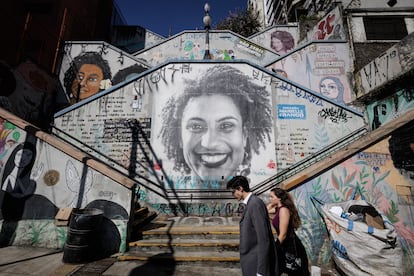The plan to kill Brazil’s Marielle Franco and hide the evidence: A perpetrator provides details of the crime
One of the two individuals awaiting trial for the murder of the councilor from Rio de Janeiro has given investigators new clues as part of a plea bargain

A former military police officer named Élcio de Queiroz, one of two individuals arrested for the 2018 murder of the Brazilian councilor and human rights activist Marielle Franco, has revealed details of the crime as part of a plea bargain with the justice system, which is seeking to find the masterminds who ordered the politician killed.
This is an important step to answer the big question that many Brazilians have been asking for the last five years: who ordered Franco to be killed, and why. The country’s Minister of Justice and Public Security, Flávio Dino, gave a news conference on Monday but did not share details about the exact nature of the information that Queiroz had provided, in order to safeguard the ongoing investigation. But the official did imply that it was quite relevant. “Élcio’s confession provides information that will lead to clarifying the entire dynamic of the crime and obvious participation by others.” The minister added that in the coming weeks there will be new police operations that could reach the individuals who ordered the murder. He also mentioned the role of the militias and organized crime in Rio de Janeiro, the main hypothesis that has always been handled by investigators to explain this political assassination.
Queiroz, a former member of the Military Police, was driving the car that chased Franco through the streets of downtown Rio de Janeiro on the night of March 14, 2018. In the back seat was Ronnie Lessa, another former military police officer, who fired four shots into the councilwoman’s face with a submachine gun. The blast also killed her driver, Anderson Gomes. Both Queiroz and Lessa, the two perpetrators, were arrested just a year after the murder, and since then they have remained in a maximum security prison awaiting a trial with no set date yet. As part of his plea bargain, Queiroz confessed to the crime, gave details of how it was planned and how they disposed of the vehicle afterwards, and presumably provided information that could lead to the masterminds. That agreement with the justice system will bring him some penal benefits, but the Minister of Justice has noted that Queiroz will remain in prison.
Queiroz decided to speak out after he realized that the police were already connecting the dots that led to a third person: Maxwell Simões, known as Suel, a former firefighter who showed off a life of luxury on his social media accounts and who considered himself the best friend of Lessa, the murderer. Simões had already been arrested and sentenced to four years in prison for obstructing the investigation, but he was on probation. On Monday he was arrested again and accused of having hidden the murder weapon and instructed collaborators to dispose of it by throwing it into the sea, in front of the Barra da Tijuca beach. In addition, it is now known that Simões worked with Lessa planning the murder for months: he kept an eye on the councilwoman’s daily routines and waited for a window of opportunity. He would drive the car and Lessa would shoot. In late 2017 they were about to kill her, but Simões claimed a mechanical failure in the car that aborted the operation. Lessa viewed this as an excuse to pull out of the job and got Queiroz to replace him.
The councilor’s sister, Anielle Franco, who is now the Minister of Racial Equality, said on Monday on her social media accounts that she trusted the investigation led by the Federal Police, but added: “I repeat the question I have been asking for five years: who ordered Marielle to be killed and why.” Following her sister’s murder, she founded the Marielle Franco Institute, dedicated to promoting policies to defend women, Brazilians of African descent, the LGBTQ+ community and the residents of favelas and peripheries. One of the organization’s goals is also to encourage Black women like herself to take the leap into politics.
During the years that former president Jair Bolsonaro was in power, Franco’s family did not want the investigation to be passed on from the Rio Civil Police (where it appeared to be stalled), which answers to the central government. The Federal Police began handling the case in February of this year, barely a month after Luiz Inácio Lula da Silva took office as the new president and gave orders to prioritize solving this crime.
Sign up for our weekly newsletter to get more English-language news coverage from EL PAÍS USA Edition
Tu suscripción se está usando en otro dispositivo
¿Quieres añadir otro usuario a tu suscripción?
Si continúas leyendo en este dispositivo, no se podrá leer en el otro.
FlechaTu suscripción se está usando en otro dispositivo y solo puedes acceder a EL PAÍS desde un dispositivo a la vez.
Si quieres compartir tu cuenta, cambia tu suscripción a la modalidad Premium, así podrás añadir otro usuario. Cada uno accederá con su propia cuenta de email, lo que os permitirá personalizar vuestra experiencia en EL PAÍS.
¿Tienes una suscripción de empresa? Accede aquí para contratar más cuentas.
En el caso de no saber quién está usando tu cuenta, te recomendamos cambiar tu contraseña aquí.
Si decides continuar compartiendo tu cuenta, este mensaje se mostrará en tu dispositivo y en el de la otra persona que está usando tu cuenta de forma indefinida, afectando a tu experiencia de lectura. Puedes consultar aquí los términos y condiciones de la suscripción digital.








































